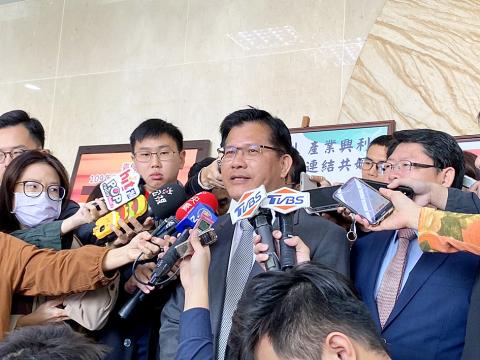The Ministry of Transportation and Communications is evaluating the Civil Aeronautics Administration’s (CAA) suggestion that it revoke Far Eastern Air Transportation’s (FAT) air operator certificate, after the airline on Dec. 13 abruptly announced that it would cease operations, Minister of Transportation and Communications Lin Chia-lung (林佳龍) said yesterday.
“We have received a recommendation from the CAA, which says that FAT’s air operator certificate should be revoked per the Civil Aviation Act (民用航空法). The ministry’s Department of Aviation and Navigation, and Legal Department have asked the civil aviation authority to offer a more complete report as grounds for certificate revocation,” Lin said.
While the airline has said that it has found investors to fund its operations and is seeking to resume flight services, the CAA has yet to allow the airline to do so.

Photo: Hsiao Yu-hsin, Taipei Times
FAT on Monday announced that it would have to delay paying employees’ salaries after Taiwan Cooperative Bank seized its operational funds, adding that a Hong Kong firm is interested in investing in the airline.
However, financial problems are only part of the airline’s troubles, Lin said.
FAT has contravened the act by ceasing operations without any advance notice, which could cost the airline its air operator certificate, he said.
Although the airline has spoken many times about potential investors, Lin said this should be treated as a separate matter.
“FAT should honestly face its financial situation, as it has trouble even paying its employees. Its top priority should be to take care of its employees,” Lin said.
The ministry is not experiencing any pressure to settle the matter quickly, he added.
Aviation safety is the ministry’s guiding principle in deciding whether the airline should be permitted to resume flight services, he said.
“The airline has claimed that [some of] its employees had misjudged the situation and erroneously made the announcement to cease operations. Its response confirmed the CAA’s worst fears. Before we can revoke [FAT’s] license, we not only have to consider that it has contravened the law, but also need to ensure that we strictly follow legal procedures in revoking its certificate, in case it challenges us in court,” he said.
Deputy Minister of Transportation and Communications Wang Kwo-tsai (王國材) said that even if the ministry does not revoke FAT’s license, the airline would have to complete several procedures before it can resume flight services.
Revoking FAT’s air operator certificate is a serious matter, and the ministry wants to ensure that it is backed by solid legal arguments if it decides to do so, Wang said, adding that the CAA has been asked to ascertain the rules of the act that the airline might have contravened.
Although the airline offered flights to Japan, South Korea and China, a majority of its flights were domestic, particularly to the outlying Kinmen and Penghu counties, Wang said, adding that the airline controls about one-third of the market share.
The ministry has plans to transport people to the outlying islands for Saturday’s elections and for the Lunar New Year holiday in case it revokes FAT’s certificate, Wang said.
The two other domestic carriers — Uni Air and Mandarin Airlines — can offer additional flights or use larger aircraft to transport the additional passengers, he said.

A strong continental cold air mass is to bring pollutants to Taiwan from tomorrow, the Ministry of Environment said today, as it issued an “orange” air quality alert for most of the country. All of Taiwan except for Hualien and Taitung counties is to be under an “orange” air quality alert tomorrow, indicating air quality that is unhealthy for sensitive groups. In China, areas from Shandong to Shanghai have been enveloped in haze since Saturday, the ministry said in a news release. Yesterday, hourly concentrations of PM2.5 in these areas ranged from 65 to 160 micrograms per cubic meter (mg/m³), and pollutants were

Taiwan’s armed forces have established response protocols for a wide range of sudden contingencies, including the “Wan Chun Plan” to protect the head of state, the Ministry of Defense (MND) said today. After US President Donald Trump on Saturday launched a series of airstrikes in Venezuela and kidnapped Venezuelan President Nicolas Maduro, concerns have been raised as to whether China would launch a similar “decapitation strike” on Taiwan. The armed forces regularly coordinate with relevant agencies and practice drills to ensure preparedness for a wide range of scenarios, Vice Minister of National Defense Hsu Szu-chien (徐斯儉) told reporters before a

EVA Airways on Saturday said that it had suspended a pilot and opened an investigation after he allegedly lost his temper and punched the first officer several times as their plane was taxiing before takeoff at Los Angeles International Airport. According to a report published on Thursday by The Reporter, the incident occurred after the flight’s Malaysian first officer tried to warn the Taiwanese pilot, surnamed Wen (文), that he was taxiing faster than the speed limit of 30 knots (55.6kph). After alerting the pilot several times without response, the first officer manually applied the brakes in accordance with standard operating

NOT AN OPENING: Trump’s violation of international law does not affect China’s consideration in attacking Taiwan; Beijing lacks capability, not precedent, an official said Taiwanese officials see the US’ capture of the president of Venezuela as a powerful deterrent to Beijing’s aggression and a timely reminder of the US’ ability to defeat militaries equipped with Chinese-made weapons. The strikes that toppled Venezuelan President Nicolas Maduro signaled to authoritarian leaders, including Chinese President Xi Jinping (習近平), US President Donald Trump’s willingness to use military might for international affairs core to US interests, one senior official in Taipei’s security circle said. That reassured Taiwan, the person said. Taipei has also dismissed the idea that Trump’s apparent violation of international law could embolden Beijing, said the official, who was not